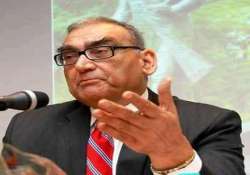PCI chief pitches for pardon for Sanjay Dutt
New Delhi, Mar 21: Following the upholding of the sentencing of film star Sanjay Dutt to five years imprisonment by the Supreme Court in 1993 Mumbai blasts case, Press Council of India chief Justice Markandey

New Delhi, Mar 21: Following the upholding of the sentencing of film star Sanjay Dutt to five years imprisonment by the Supreme Court in 1993 Mumbai blasts case, Press Council of India chief Justice Markandey Katju has appealed to Maharashtra Governor K Sankarnarayanan to pardon the actor.
In a statement issued here, Katju sought pardon for Dutt under Article 161 of the Constitution saying that he had not been found guilty of having played a role in the 1993 blasts and had suffered a lot.
Katju said the Supreme Court, having found that Sanjay Dutt had in his possession a prohibited weapon without a licence, awarded him the minimum imprisonment which was
prescribed under law.
“Section 25 (1(A) of the Arms Act states that if a person has in his possession a prohibited weapon without a licence, he shall be awarded punishment of not less than 5 years imprisonment and not more than 10 years,” Katju said.
He added the power of pardon under Article 161 by the Constitution is different from judicial power as the Governor or the President can grant pardon or reduce the sentence of the court even if a minimum is prescribed.
“Hence, there is no doubt that the Governor can grant pardon/reduce the sentence. For example, in the case of Commander Nanavati who was held guilty of murder, the Governor gave him pardon although the minimum sentence for murder is life sentence,” Katju said.
He said the Supreme Court had not found Dutt guilty for the 1993 bomb blasts but only found him guilty of having in his possession a prohibited weapon without licence.
“Surely, this is a lesser offence than murder. When the Governor of Maharashtra granted pardon to Nanavati, surely he can grant pardon to Sanjay,” Katju said.
He added though Dutt had committed an offence there are extenuating circumstances like that the event happened 20 years ago.
In a statement issued here, Katju sought pardon for Dutt under Article 161 of the Constitution saying that he had not been found guilty of having played a role in the 1993 blasts and had suffered a lot.
Katju said the Supreme Court, having found that Sanjay Dutt had in his possession a prohibited weapon without a licence, awarded him the minimum imprisonment which was
prescribed under law.
“Section 25 (1(A) of the Arms Act states that if a person has in his possession a prohibited weapon without a licence, he shall be awarded punishment of not less than 5 years imprisonment and not more than 10 years,” Katju said.
He added the power of pardon under Article 161 by the Constitution is different from judicial power as the Governor or the President can grant pardon or reduce the sentence of the court even if a minimum is prescribed.
“Hence, there is no doubt that the Governor can grant pardon/reduce the sentence. For example, in the case of Commander Nanavati who was held guilty of murder, the Governor gave him pardon although the minimum sentence for murder is life sentence,” Katju said.
He said the Supreme Court had not found Dutt guilty for the 1993 bomb blasts but only found him guilty of having in his possession a prohibited weapon without licence.
“Surely, this is a lesser offence than murder. When the Governor of Maharashtra granted pardon to Nanavati, surely he can grant pardon to Sanjay,” Katju said.
He added though Dutt had committed an offence there are extenuating circumstances like that the event happened 20 years ago.